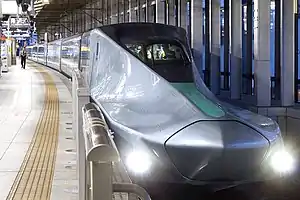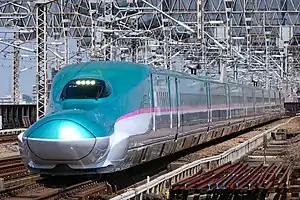| Class E956 "ALFA-X" | |
|---|---|
 | |
| Manufacturer | Hitachi, Kawasaki Heavy Industries |
| Entered service | May 9, 2019 |
| Number built | 1 set (10 vehicles) |
| Formation | 10 cars |
| Fleet numbers | S13 |
| Operators | JR East |
| Lines served | Tohoku Shinkansen |
| Specifications | |
| Car length | 24.5 m (80 ft 5 in)(intermediate cars) 26.25 m (86 ft 1 in) (end cars) |
| Width | 3.35 m (11 ft 0 in) |
| Height | 3.7 m (12 ft 2 in) |
| Maximum speed | 400 km/h (250 mph) |
| Traction system | 500 kW (671 hp) motors (4 per car) |
| Power output | 12 MW (16,092 hp) |
| Electric system(s) | 25 kV AC 50 Hz Overhead catenary |
| Current collector(s) | Pantograph |
| Track gauge | 1,435 mm (4 ft 8+1⁄2 in) standard gauge |
The Class E956 (E956形), branded "ALFA-X", is a ten-car experimental Shinkansen train operated by East Japan Railway Company (JR East) in Japan to test technology to be incorporated into future trains operating at speeds of up to 360 km/h (225 mph). The name is an acronym for "Advanced Labs for Frontline Activity in rail eXperimentation".[1] The first train was unveiled on May 9, 2019.[2] Its test run is mainly performed in sections between Sendai and Shin-Aomori of the Tohoku Shinkansen line, and, in some cases, on the Hokkaido Shinkansen line.
Design
The experimental trainset is being tested at speeds of up to around 400 km/h (250 mph) to evaluate new technologies to be incorporated into new trains to operate in revenue service at speeds of up to 360 km/h (225 mph).[3] These technologies include dampers to reduce vibration and the likelihood of derailment in major earthquakes.[3] It also tests body designs that reduce snow adherence.[3]
The E956 train evaluates two different end car nose profiles, just like the earlier Fastech 360.[4] The nose of car 1 is 16 metres (52 ft 6 in) long, and is a brand new design, while the nose of car 10 is similar to the E5 Series Shinkansen and H5 Series Shinkansen, but is 22 metres (72 ft 2 in) long, with only 4.5 metres (14 ft 9 in) remaining for passengers with three rows of seating.[5] The different nose profiles on Car 1 and Car 10 where designed to compare air resistance and impact noise caused by pressure waves when the train enters and exits tunnels. Car 10's nose was designed to minimize noise. Each passenger car prototype has different window shapes, to test wind resistance for each type of design. [6]
The E956 features eddy current brakes and an aerodynamic braking system attached to the car's roof, called air brakes or spoilers.[7] Two types of pantographs are also being evaluated on the train, to test for noise and wind resistance. [6]
Noise reduction has proven to be a major challenge in the design and operation of the trains; a test centre evaluates simulated train noises generated by speakers, used to design walls on the elevated track sections of the line for the purposes of noise reduction. A designer explains that this is a major hurdle that must be overcome before the higher speed train can be deployed. Newer sound dampening polyester panels held in place by steel casings are attached to walls along the track; they are also weatherproof (as older designed absorbed water when raining or snowing, limiting their effectiveness). As of April 2023, there are also several design features that they were not sharing with the public, to avoid releasing their technical research. [6]
History
JR East officially announced its plans to build a ten-car ALFA-X test train on 4 July 2017, to be delivered in spring 2019 for extensive testing and evaluation.[1] The finished train was unveiled on May 9, 2019.[2]
The train reached a speed of 320 km/h (200 mph) in May 2019, matching the top operating speed of the fastest services on the line.[8] By June that same year, the train was regularly measured to be running at 360 km/h (225 mph) by rail enthusiasts.[9]
The train was first observed running at the announced top planned test speed of 400 km/h (250 mph) on December 14, 2019.[10]
The Plarail (series of toy trains) "Ippai Tsunago" Shinkansen Test Train ALFA-X began to be sold on December 26, 2019.
The train was observed in Hokkaido for cold weather testing on February 12, 2020[11] and February 3, 2021.[12]
The train reached a speed of 382 km/h (237 mph) on 27 October 2020, setting the new speed record trains running commercially.[13]
References
- 1 2 "JR East to build ALFA-X 360 km/h Shinkansen testbed". Railway Gazette. 7 July 2017. Archived from the original on 18 July 2017. Retrieved 19 July 2017.
- 1 2 Geuss, Megan (10 May 2019). "Japanese railway company starts testing 249mph bullet train speeds". Ars Technica. Retrieved 13 May 2019.
- 1 2 3 Kusamachi, Yoshikazu (4 July 2017). JR東日本の新幹線試験車「ALFA-X」2019年春完成…「営業360km/h」を検証へ [New "ALFA-X" JR East experimental shinkansen train to be completed in spring 2019 - to test operations at 360 km/h]. Response (in Japanese). Japan: IID Inc. Archived from the original on 18 July 2017. Retrieved 19 July 2017.
- ↑ "ALFA-X nose is 22 m long". Railway Gazette. DVV Media International Ltd. 14 February 2019.
- 1 2 3 The Tohoku Shinkansen: Full Speed Ahead, Japan Railway Journal (television program). NHK World. 13 April 2023. Event occurs at 7:44. Retrieved 13 April 2023.
- ↑ ALFA-X: The Next Generation Shinkansen Experimental Train In: Railvolution. nr. 1, 2019, p. 28
- ↑ "JR East shinkansen ALFA-X prototype hits 320 km/h in test run in northeastern Japan". The Japan Times Online. 16 May 2019. ISSN 0447-5763. Retrieved 22 September 2019.
- ↑ ALFA-X(E956) 360km/h走行へ- 2019.6.8-9, retrieved 22 September 2019
- ↑ ALFA-X(E956) 400km/h走行へ 2019.12.14-15, retrieved 16 December 2019
- ↑ 次世代新幹線、試験車両が道内初走行 新函館北斗で報道陣に公開 - Hokkaido Shinbun (02/15/2020)
- ↑ "【4K】ALFA-X(E956) 北海道遠征まとめ 2021.2.3-11". YouTube.
- ↑ "New bullet train Alpha-X hits top speed of 382 KPH in test run | the Asahi Shimbun: Breaking News, Japan News and Analysis".
External links
- JR East 2017 news release (in Japanese)
- JR East E956 data sheet (in Japanese)
- The Tohoku Shinkansen: Full Speed Ahead , Japan Railway Journal, TV program at NHK



